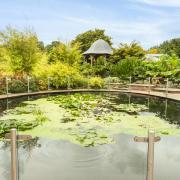Pull quote: 'These havens aren’t just picturesque landscapes, they’re the lifeblood for countless valuable insects, mammals and birds'
A summer meadow is a beautiful sight with swathes of colour, buzzing with bees and other insects. Sadly, meadows have become a much rarer sight across the UK. Here in Cheshire, we've lost a staggering 99 per cent of our meadows since the 1940s.
Due to huge declines in wildflower meadows, it’s perhaps no surprise that nationally we’ve lost at least 50 per cent of our insects over the past 50 years; 41 per cent of the Earth's remaining five million insect species are now threatened with extinction. But there’s hope. At Cheshire Wildlife Trust, we’re working hard to bring back Cheshire’s lost meadows through our Pollinating Cheshire project.
The project began in 2016 as a response to the alarming decline of wildflower meadows. These havens aren’t just picturesque landscapes, they’re the lifeblood for countless valuable insects, mammals and birds. Caterpillars, grasshoppers, beetles and moths find sustenance in the blooms, and in turn, provide food for insectivorous birds. Field voles navigate the tall grasses, while barn owls hunt under the vast sky. But with their disappearance, this intricate web of life unravels. However, despair gives way to action. We are championing a collaborative approach, partnering with landowners who see the value of restoring their land for nature.
This isn’t about buying land but empowering landowners to create meadows. As experts, we can guide them through every step, from initial soil analysis to the sowing of wildflower seeds and ongoing management.
And the results speak for themselves. More than 300 acres of meadows have been created, or enhanced in the past five years. Imagine the abundance of wildlife thriving within these reclaimed havens. But the vision extends further. By 2030, we want to revitalise 750 acres, creating a patchwork of wildlife-rich meadows across Cheshire.
What makes meadows so special?
Beyond their beauty, meadows offer a multitude of benefits:
Pollination powerhouses – meadows teem with pollinators like bees and butterflies, essential for healthy ecosystems and food production.
Natural flood defences – their deep root systems absorb water, reducing flood risks and replenishing groundwater.
Carbon capture champions – meadows store carbon, helping combat climate change.
Wildlife havens – they provide vital habitat for a staggering array of creatures, from bees to barn owls.

Meet the team bringing back Cheshire’s meadows
Hannah Dalton, senior living landscape officer
Hannah has been working at Cheshire Wildlife Trust for five years and leads our Pollinating Cheshire project. She works tirelessly across the country working with farmers, local charities, landowners and on our own nature reserves to bring back our lost meadows. Through her work. Hannah has helped create, restore and enhance 296 acres of meadow.
Daniel Nash, land management officer
Dan has been working at Cheshire Wildlife Trust for two years taking the Bickley Hall Farm nursery from strength to strength. What started as a few hundred wildflowers being grown in the garden has now developed into a professional nursery with an automated irrigation system and multiple polytunnels. Last year Dan helped oversee the growth of more than 20,000 wildflower plants, along with a team of incredible volunteers.
Be a meadow maker
We’ve launched an appeal to help us reach our ambitious meadow-making goals. Can you help?
£20 could help pay for 20 wildflower plugs to be grown in our nursery.
£34 could help buy five bags of peat-free compost for the nursery.
£50 could help pay for soil sampling for one meadow.
£100 could pay for half a day of seed harvesting from a donor meadow.
By donating to our appeal and becoming a meadow maker you’ll be part of the six-season transformation – from preparing the soil to a flourishing meadow buzzing with life.
Planning pollination
Year 1
Spring: Laying the groundwork
Experts assess the land, analysing vegetation and soil to ensure the perfect match for a rich meadow.
Summer: Gathering nature's bounty
Seeds are collected from a thriving 'donor' meadow, choosing one with similar conditions for the best chance of success.
Autumn: Sowing the seeds of change
Land is prepared and our precious local seed is scattered. A gentle roll ensures it binds to the soil to germinate.
Winter: Watchful waiting
Things are dormant through the winter. However, the frost stratifies the seed making it ready to germinate in the spring
Year 2
Spring: A vibrant tapestry
Flowers bloom, attracting pollinators. We add diversity as needed.
Summer: A symphony of life
Butterflies flutter, birds sing and the meadow hums with life. A new wildlife haven is born, ready to donate future seeds.
To find out more about the Pollinating Cheshire project, the Bickley Hall Farm nursery and the Cheshire Wildlife Trust plans to bring meadows back to Cheshire, visit cheshirewildlifetrust.org.uk/meadows-appeal
To find more out about volunteering opportunities in the nursery, visit cheshirewildlifetrust.org.uk/volunteering



























